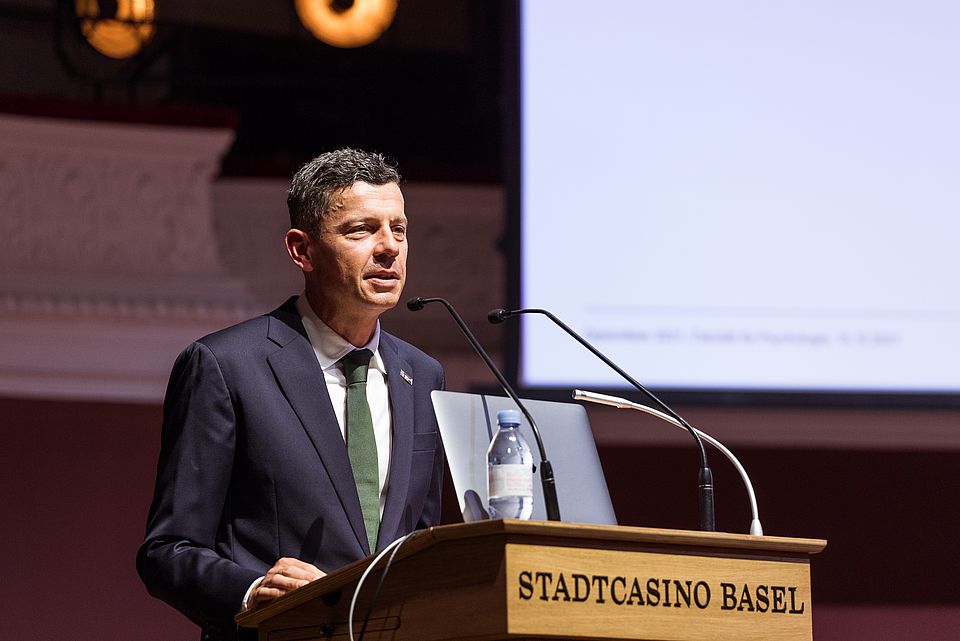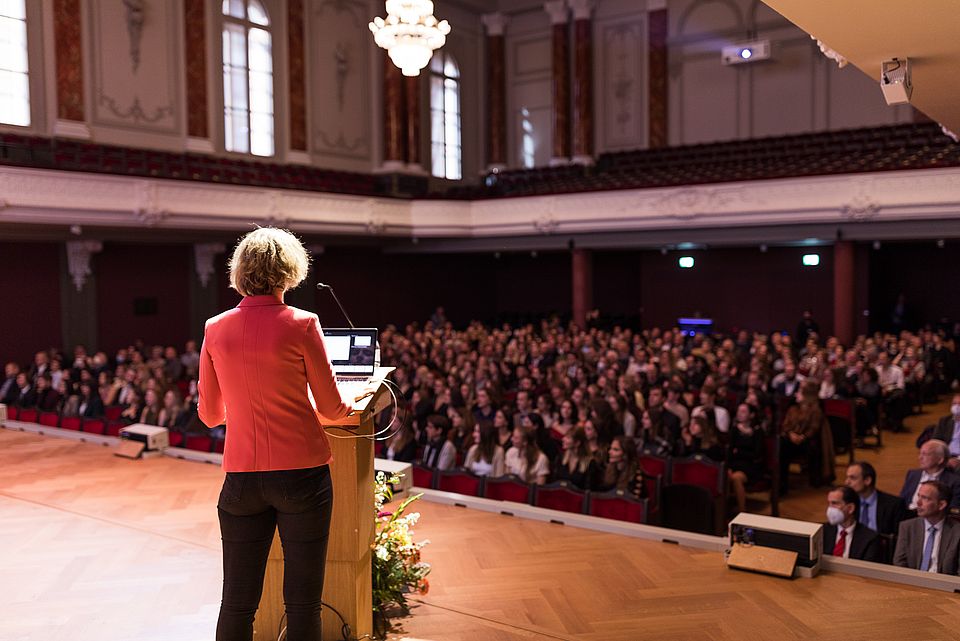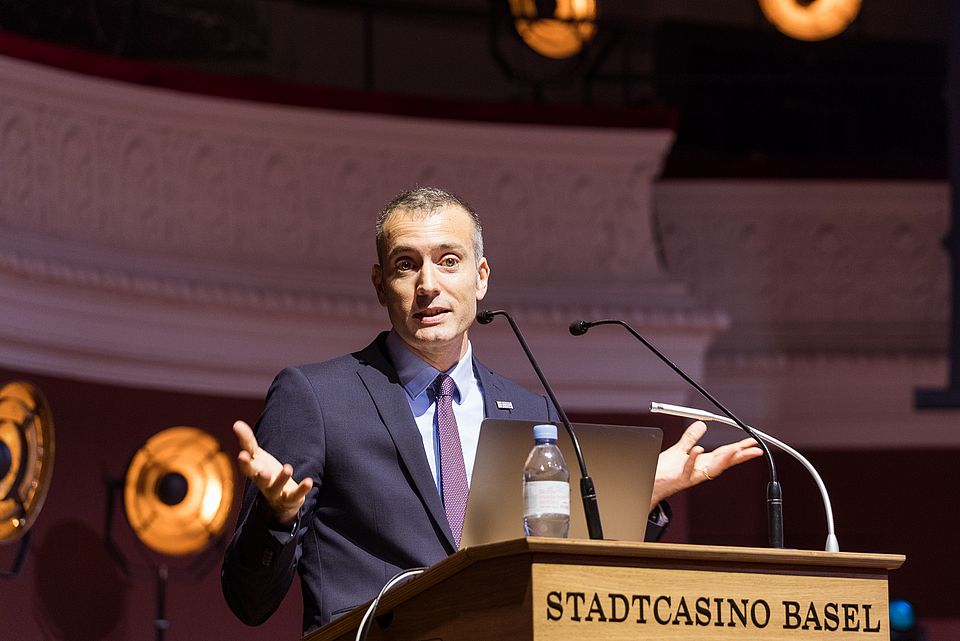Doctoral studies
The goal and the function of the doctorate is the acquisition of scientific competence and the development of methodological knowledge. The Faculty of Psychology’s doctoral degree regulations set out binding admission requirements, the components and the formal procedure of the doctoral studies, which are additionally explained on this website. Registration for doctoral studies is compulsory. The University of Basel offers various support services (advice, training, funding). The doctoral studies comprise the dissertation, the doctoral examination, programme framework, and—if a condition of admission—the colloquium, and are subject to governance.
Dissertation
The dissertation is an independent research project and must demonstrate the doctoral student’s ability to work independently and meet the scientific requirements of the topic. A dissertation can be submitted as either a cumulative dissertation or a monograph. A cumulative dissertation includes at least one published or accepted for publication peer-reviewed article (of which the doctoral candidate is the first author) and at least two further articles (of which the doctoral candidate is the first or co-author) that have been submitted, accepted for publication, or published in a peer-reviewed journal, plus a 10- to 20-page synopsis, which integrates the research results into a coherent research strategy and research question, and from which the doctoral student’s own personal contribution is clearly evident. The format of the dissertation is not specified except for the cover sheet and the declaration of scientific integrity and is worked out with the principal supervisor.
Doctoral examination
After completion of the dissertation and meeting the objectives of the programme framework (see below) as well as any further requirements, doctoral students submit the application for initiation of the doctoral degree procedure with the dissertation in triplicate to the Office of the Dean of Studies. The Office of the Dean of Studies forwards the dissertation to the PhD Committee, whose members each write an independent evaluation, award the dissertation a grade, and within three months send the evaluation, together with a recommendation for acceptance or rejection, to the Office of the Dean of Studies. There must be at least two evaluations, with one evaluation each from the principal and the subsidiary supervisor. As soon as at least two evaluations have been submitted to the Office of the Dean of Studies, the Office of the Dean of Studies forwards the evaluations to the Doctoral Board for definitive acceptance or rejection of the dissertation. The dissertation and the evaluations are available at the Office of the Dean of Study at least two weeks before the doctoral examination for confidential inspection by members of the Faculty Assembly. The evaluations are made available to the candidate no later than two weeks before the doctoral examination. After receiving the decision of the Doctoral Board regarding the definitive acceptance of the dissertation, the Office of the Dean of Studies requests the candidate to submit proof of fulfilment of any conditions for admission and credit points acquired during the doctorate together with the academic progress summary in accordance with the doctoral agreement. Upon their receipt, the Office of the Dean of Studies, in cooperation with the candidate, determines the date for the public doctoral examination, which is conducted by the members of the PhD Committee. This is chaired by a faculty member appointed by the Doctoral Board who is not a member of the PhD Committee. The doctoral examination is a public oral examination of at least 60 and a maximum of 90 minutes. It begins with a 30-minute presentation by the candidate. Afterwards, a scientific debate of at least 30 minutes takes place. At the end of the debate, members of the PhD Committee jointlyaward a grade, which is recorded on the confirmation of the doctoral examination. The doctoral examination contributes one-third and the dissertation two-thirds to the final degree grade. After successfully passing the doctoral examination, the candidate swears an oath after which confirmation of the completed doctoral examination is handed over. Following this, the title "PhD Graduand” may be used. After the doctoral examination, three copies of the dissertation must be submitted to the University Library in accordance with the University Library regulations and with the cover sheet provided for the dissertation. The doctoral degree certificate is generally delivered within six weeks following receipt of confirmation from the UB regarding fulfilment of the publication obligation. It entitles the holder to the academic degree of "PhD".
Programm framework/objectives
Doctoral students are responsible for successfully completing at least 12 ECTS within the programme framework. The necessary ECTS may be obtained from the following three areas (1-3); at least two-thirds must be obtained in areas 1 and 2:
- External scientific courses on the dissertation topic
- Internal scientific courses on the dissertation topic
- Teaching and provision of other training
Areas 1 and 2 include doctorate-level courses related to the dissertation topic at the Faculty of Psychology of the University of Basel or other universities. Visits to summer schools are credited according to the credit points awarded by the summer schools. Further doctorate-level courses are credited with the corresponding credits, as long as they are included in the University of Basel course directory. The assessment format is based on criteria given therein. Regarding internal scientific events, care should be taken to attend doctoral-level courses. Under certain circumstances, it may make sense also to attend courses from the Bachelor's or Master's degree programme. However, credits from these courses should be an exception and must first be discussed with the principal supervisor and recorded according to the Learning Contract. ECTS that were acquired during Bachelor or Master studies cannot be credited to the doctorate. ECTS acquired outside the University of Basel may be counted, provided that they fulfil the necessary criteria within the programme framework at the doctoral level. Before attending such courses, credit should be confirmed by the principal supervisor. The courses must also be arranged as per the Learning Contract. External scientific courses typically include contributions to international conferences. A personal contribution at a conference earns 1 credit points. Doctoral students are required to attend research lectures at the Faculty of Psychology on a regular basis, even if they are not directly related to the dissertation topic. Other selected events and courses can be counted within the programme framework, provided they meet the criteria. These include, for example, courses offered in other doctoral programmes at Swiss universities. Courses that are passed are credited with the respective number of credits assigned to them. The principal supervisor decides on eligibility of course work for credit in the programme framework. Eligibility is recorded as per the Learning Contract. Matriculation over the entire period of doctoral studies at the University of Basel is mandatory for all Faculty of Psychology doctoral students. Doctoral candidates must register for the doctorate at the earliest possible date.
Colloquium
Admission to doctoral studies requires a Master of Science in Psychology degree from the University of Basel. Other degrees awarded by the University of Basel or a university recognized by the University of Basel may be recognized as wholly or partially equivalent by the Doctoral Board. In the case of partial equivalence, admission is subject to a maximum of 24 ECTS. Requirements may include either individual courses from the Master's degree programme or the colloquium. The colloquium is an oral examination of one hour’s duration, through which knowledge of psychology related to the specific dissertation project can be proven. It is conducted by two members of Group I of the Faculty of Psychology presided over by a chairperson elected by the Faculty Assembly and is graded as either passed or failed. If the colloquium is assessed as failed, it can be repeated once, after three months at the earliest. Therefore, the first appointment for the colloquium must be scheduled for the start of the month not later than nine months following admission, meaning that it can be repeated within the one-year period, if necessary. Failing the colloquium for a second time or exceeding the deadline results in breaking the conditions of supervision and leads to termination of the academic supervision and therefore for the end of the doctorate.
Governance/supervision
- The Doctoral Board is the lead body of the doctoral programme and oversees the content and procedure of doctoral training at the Faculty of Psychology. It consists of the Dean, the Research Dean and the Dean of Studies.
- The PhD Committee consists of the supervisors of the respective doctoral students. At the request of the principal supervisor, the Doctoral Board determines the composition of the PhD Committee. Further information on the composition of the PhD Committee can be found in the doctoral degree regulations of the Department of Psychology. The PhD Committee supervises and monitors implementation of the dissertation.
- A doctoral agreement between the doctoral candidate and the principal supervisor is concluded during the first semester. The doctoral agreement includes a provisional study plan and schedule for the doctorate, any requirements and general conditions as well as the proposed selection of options to meet the programme objectives (number of credit points)—a personalised curriculum. Additionally, regular meetings are recommended for explicit discussion of whether the doctorate is progressing according to the doctoral agreement. If significant changes occur in this process, the doctoral agreement should be updated.
Degree certificate and diploma ceremony
Upon successful completion of the doctoral studies, students receive a doctoral degree certificate from the Dean and the Dean of Studies, which records the degree programme completed as well as the final grade. A graduation ceremony takes place every autumn — registration is required here. Diplomas from the respective spring semester are handed over direct during the ceremony. Students who complete their studies in the fall semester receive their diplomas in advance by mail.






